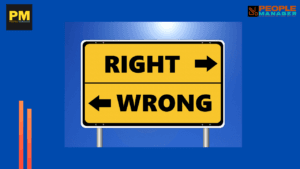The importance of empathy in HR, including employee retention and conflict resolution
"Empathy is no longer a soft skill—it's a strategic imperative for HR leaders of today. Be it retaining great talent, resolving conflict, or just giving kudos, empathy helps HR professionals create an ecosystem where everyone feels valued, listened to, and cared for. When there is a crisis, change, or ambiguity, empathy becomes the sticky that keeps the culture intact. It builds resilience through recognizing every single employee's humanness, so people can be deeply connected and truly collaborate."- Manish Mohta

In today’s fast-paced modern workplace, technical proficiency and process efficiency are no longer enough for successful human resource management. Empathy—the ability to understand and share the feelings of another—is emerging as a core competency for HR professionals. From employee retention to workplace conflict, empathy enables HR professionals to create a more inclusive, respectful, and resilient organizational culture. This practice guide addresses empathy in HR, on the what, why, and how of deploying empathy to improve employee retention and conflict management. As organizations become more diverse and employees’ needs shift toward meaning and belonging, HR must shift from simply being policy police to becoming emotional designers of the work environment.
1. Understand Empathy in HR
What is Empathy in HR?
Empathy in HR refers to the understanding and recognition of employees’ feelings, perspectives, and situations. Careful listening, empathetic responding, and behaving in a manner that reflects an awareness of one’s and others’ needs, empathy exists in everything from how policies are communicated to how layoffs are handled, and therefore becomes central to effective HR leadership.
Why is Empathy Important in HR?
- Builds Trust: Sympathetic interactions build trust between staff and HR, which makes them honest and transparent.
- Facilitates Better Communication: Empathy translates body language and emotions into better communication.
- Fosters Psychological Safety: Staff are willing to report issues and innovate if they are being heard.
- Strengthens Culture: Empathy makes people a culture where diverse ideas are fostered.
- Strengthens Decision-Making: Empathy provides context to numbers so that HR finds it easy to make fair and balanced decisions.
How to Practice Empathy in HR
- Active Listening: Give full attention, don’t interrupt, and repeat what you hear to ensure clarity.
- Non-Verbal Awareness: Pay attention to body language and tone, especially in virtual settings where verbal cues may not be subtle.
- Open-Ended Questions: Use questions that encourage story and sharing of inner feelings.
- Validate Emotions: Acknowledge and normalize the employee experience without judgment.
- Continuous Learning: Invest in emotional intelligence (EQ) development and regularly reflect on your own biases and responses.
2. Empathy and Employee Retention
What is the Role of Empathy in Retention? Empathy-driven HR practices increase a positive employee experience, crucial for retention. HR develops custom retention strategies by knowing the drivers, challenges, and aspirations of workers. Empathic HR individuals constantly recognize the requirements of employees in regards to mental wellness, work-life balance, and professional progress.
Why Use Empathy to Improve Retention?
- Increases Engagement: Workers who feel heard and seen are more motivated.
- Reduces Turnover: Solving problems with compassion can halt dissatisfaction from running out of control.
- Improves Onboarding: Customized onboarding processes greet and assist new workers, creating long-term loyalty.
- Supports Work-Life Balance: Compassion allows the HR department to offer flexible arrangements based on individual needs.
- Enhances Employer Brand: Organizations that care for their people attract and retain talent more effectively.
How to Use Empathy in Retention Initiatives
- Conduct Stay Interviews: Conduct open-ended questioning on workers’ satisfaction, challenges, and career goals.
- Customize Development Plans: Plot career progression within each person’s strengths, interests, and situation.
- Monitor Employee Sentiment: Use surveys, feedback systems, and one-on-ones to track morale and address issues in advance.
- React to Life Events: Offer individualized intervention when personal events or crises are encountered (e.g., death, parental leave, illness).
- Express Thanks: Acknowledge employees formally and consistently by thoughtful actions that genuinely celebrate.
- Use Exit Interviews Positively: Hearken with empathy and sympathy to exiting employees to get at the root reasons for turnover and improve future experiences.
3. Empathy in Conflict Resolution
What is the Role of Empathy in Conflict Resolution?
Empathy enables the resolution of conflict in a positive manner by listening to the perspective of both sides. It enables the conversion of confrontations into instances of cooperation and harmony. Empathetic conflict resolution offers a safe platform where employees feel motivated to raise concerns and cooperate to reach resolutions.
Why Use Empathy in Conflict Management?
- De-escalates Tension: Emotion identification de-escalates anger and defensiveness.
- Fosters Respect for One Another: Encourages free conversation based on respect and shared goals.
- Uncovers Root Issues: Empathy tends to address the core of the issue, such as miscommunication, unfulfilled expectations, or cultural differences.
- Fosters Justice: Offers an avenue where every voice is heard and respected in conflict resolution.
- Enhances Team Harmony: When employees see fair, compassionate conflict resolution, they promote trust in HR and leaders.
How to Apply Empathy in Conflicts
- Prepare to Listen: Go into the encounter with an open heart and a non-judgmental mind.
- Create a Safe Space: Offer privacy and a neutral, non-threatening space in which to communicate.
- Acknowledge Emotions: Permit each side to rant and rave about how they feel and validate those feelings without being judgmental.
- Facilitate Understanding: Permit each side to state their position and listen to the other’s.
- Guide Toward Solution: Collaborate on solutions equally acceptable that both fulfill emotional as well as practical requirements.
- Follow Up: Return to the conversation at a later time to retain that solution as well as relationships intact.
Most Effective Practices of Encouraging Empathy Within HR Teams
- Lead by Example: HR CEOs need to model empathetically themselves in their practices and decision-making.
- Offer Training: Offer training and role-plays in workshops on emotional intelligence, active listening, and embracing communication.
- Practice Reflectivity: Organize journaling, team debriefs, and mindfulness sessions after difficult conversations or events.
- Collect Feedback: Ask employees to show how HR can support them emotionally better, and apply this feedback for continuous enhancement.
- Infuse Empathy in Policy: Develop adaptive, employee-centric policies for parental leave, mental well-being, working from home, and more.
- Embracing Diversity: Acknowledge and celebrate cultural, generational, and individual diversity as strengths.
- Develop Peer Support Systems: Set up mentorship or buddy systems through which employees can swap challenges and help one another.
Empathy is no longer a soft skill—it’s a strategic imperative for HR leaders of today. Be it retaining great talent, resolving conflict, or just giving kudos, empathy helps HR professionals create an ecosystem where everyone feels valued, listened to, and cared for. When there is a crisis, change, or ambiguity, empathy becomes the sticky that keeps the culture intact. It builds resilience through recognizing every single employee’s humanness, so people can be deeply connected and truly collaborate.
Empathetic HR professionals are better positioned to resolve today’s complex workplace challenges. By listening actively, empathetically validating emotions, and responding with empathy, HR can transform the employee experience and propel long-term organizational success. Being empathetic isn’t merely the compassionate thing to do; it is the intelligent thing to do for any HR professional seeking to lead with heart and make a difference. In a future of automation and artificial intelligence, one skill uniquely human is empathy—one that must be fought for by HR if it is to remain effective and valuable.
Empathy is the cornerstone of effective Human Resources (HR) management, as it is a critical ingredient in building a healthy work environment. By actually listening and being concerned about employees’ ideas and feelings, HR professionals can build healthier relationships that result in increased trust and loyalty levels. This further enhances employee retention because individuals are likely to remain in organizations where they feel cared for and heard. Empathy is also vital in conflict resolution because it allows HR to get involved in disputes with fairness and understanding. It allows for a better understanding of the issues at stake, encouraging resolutions that respect all parties and maintain a peaceful working atmosphere.
Ultimately, empathy in HR is not a soft skill—it’s an organizational strategy for health and employee well-being. HR empathy is not about listening to employees’ words alone—it’s about actively collaborating on employees’ concerns, perceiving things as the employees perceive, and acting compassionately and helpingly. Where HR individuals have empathy, they help establish an open psychological space where employees freely express ideas, problems, or grievances. The openness comes across as honest communication, and communication is what ensures problems get sorted out early to avoid turning into huge issues.
Employee retentionally, empathetic HR practices such as awarding flexible work arrangements, providing mental health care, and recognizing employee achievements cause increased job satisfaction and loyalty. Valued employees are not only more likely to stay with the company but also more productive and engaged at work.
Conflict resolution-wise, empathy enables HR to look beyond top-level problems and identify the source of conflict issues. By learning the emotional and motivational drivers for everyone involved, HR can assist in facilitating better conversations, decreasing defensiveness, and driving teams toward winning solutions. Besides resolving conflict more productively, this also builds higher-quality work relations and team trust.
In general, empathy empowers the HR function to become a bridge between employees and management and ensures organizational policy and decision-making are properly tied to the human needs of the workforce. Thus, it enables the HR function to shift from a transactional to a strategic ally in building long-term success. For further insights into the evolving workplace paradigm, visit








